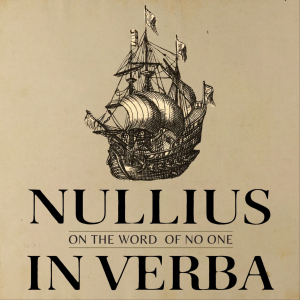
Nullius in Verba
Science Podcasts
Nullius in Verba is a podcast about science—what it is and what it could be. It is hosted by Smriti Mehta from UC Berkeley and Daniël Lakens from Eindhoven University of Technology.
Our logo is an homage to the title page of Novum Organum, which depicts a galleon passing between the mythical Pillars of Hercules on either side of the Strait of Gibraltar. The title of the podcast comes from the motto of the Royal Society, set in typeface Kepler by Robert Slimbach. Our theme song is Newton’s Cradle by Grandbrothers.
Location:
United States
Genres:
Science Podcasts
Description:
Nullius in Verba is a podcast about science—what it is and what it could be. It is hosted by Smriti Mehta from UC Berkeley and Daniël Lakens from Eindhoven University of Technology. Our logo is an homage to the title page of Novum Organum, which depicts a galleon passing between the mythical Pillars of Hercules on either side of the Strait of Gibraltar. The title of the podcast comes from the motto of the Royal Society, set in typeface Kepler by Robert Slimbach. Our theme song is Newton’s Cradle by Grandbrothers.
Twitter:
@nulliusverbapod
Language:
English
Episode 75: Incitamenta - I
Duration:00:51:31
Episode 74: Notiones Vague
Duration:01:07:24
Episode 73: Scientismus - II
Duration:00:56:02
Episode 72: Scientismus - I
Duration:00:47:40
Episode 71: Commentarius Scientificus: Fraus?
Duration:00:54:09
Prologus 71: Is the Scientific Paper A Fraud (P. Medawar)
Duration:00:16:18
Episode 70: Scientia Tacita
Duration:01:16:21
Episode 69: Fraus P-Valoris - II
Duration:00:45:57
Episode 68: Fraus P-Valoris - I
Duration:00:43:14
Episode 67: Investigatio Inhonesta
Duration:01:00:49
Episode 66: Psychologia Controversiae
Duration:01:02:34
Prologus 66: The Psychology of Controversy (E. G. Boring)
Duration:01:05:25
Episode 65: Scientia de Scientia - II
Duration:00:55:50
Episode 64: Scientia de Scientia - I
Duration:00:46:33
Prologus 64: Why Metascience? (M. Bunge)
Duration:00:49:49
Episode 63: Experimentatio Exploratoria
Duration:01:08:22
Episode 62: Experimenta Exploratoria
Duration:01:08:07
Episode 61: Septem Vacae Sacrae III
Duration:01:14:59
Episode 60: Septem Vacae Sacrae II
Duration:00:38:57
Episode 59: Septem Vacae Sacrae
Duration:01:08:38